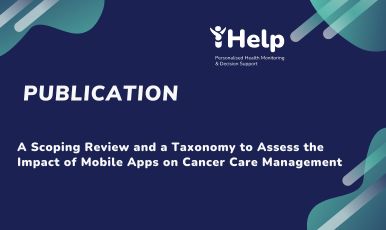SOURCE: Article in Journals – Cancers; Publisher: MDPI, Published: 15 March 2023
A Scoping Review and a Taxonomy to Assess the Impact of Mobile Apps on Cancer Care Management
by Eshita Dhar1,2, Adama Ns Bah1,2, Irene Alice Chicchi Giglioli3, Silvia Quer3, Luis Fernandez-Luque3, Francisco J. Núñez-Benjumea4, Shwetambara Malwade2, Mohy Uddin5, Umashankar Upadhyay1,2,6 and Shabbir Syed-Abdul1,2,7,*
Abstract
Mobile Health (mHealth) has a great potential to enhance the self-management of cancer patients and survivors. Our study aimed to perform a scoping review to evaluate the impact and trends of mobile application-based interventions on adherence and their effects on health outcomes among the cancer population. In addition, we aimed to develop a taxonomy of mobile-app-based interventions to assist app developers and healthcare researchers in creating future mHealth cancer care solutions. Relevant articles were screened from the online databases PubMed, EMBASE, and Scopus, spanning the time period from 1 January 2016 to 31 December 2022. Of the 4135 articles initially identified, 55 were finally selected for the review. In the selected studies, breast cancer was the focus of 20 studies (36%), while mixed cancers were the subject of 23 studies (42%). The studies revealed that the usage rate of mHealth was over 80% in 41 of the 55 studies, with factors such as guided supervision, personalized suggestions, theoretical intervention foundations, and wearable technology enhancing adherence and efficacy. However, cancer progression, technical challenges, and unfamiliarity with devices were common factors that led to dropouts. We also proposed a taxonomy based on diverse theoretical foundations of mHealth interventions, delivery methods, psycho-educational programs, and social platforms. We suggest that future research should investigate, improve, and verify this taxonomy classification to enhance the design and efficacy of mHealth interventions.






